高考英语省略句解析
- 格式:docx
- 大小:37.03 KB
- 文档页数:3
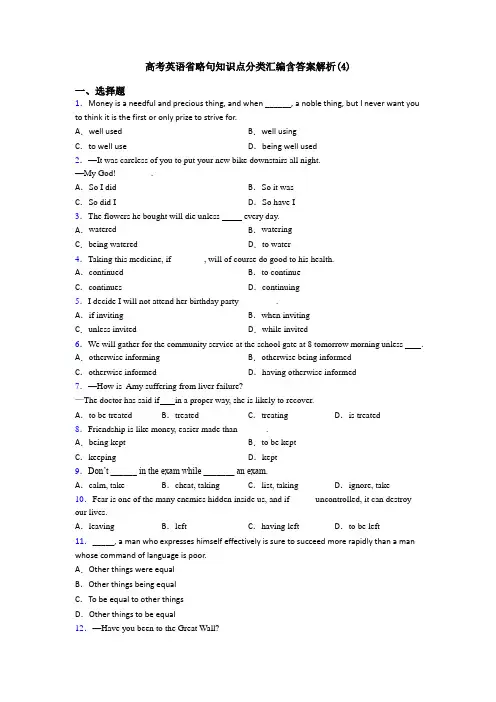
高考英语省略句知识点分类汇编含答案解析(4)一、选择题1.Money is a needful and precious thing, and when ______, a noble thing, but I never want you to think it is the first or only prize to strive for.A.well used B.well usingC.to well use D.being well used2.—It was careless of you to put your new bike downstairs all night.—My God!________.A.So I did B.So it wasC.So did I D.So have I3.The flowers he bought will die unless every day.A.watered B.wateringC.being watered D.to water4.Taking this medicine, if _______, will of course do good to his health.A.continued B.to continueC.continues D.continuing5.I decide I will not attend her birthday party ________.A.if inviting B.when invitingC.unless invited D.while invited6.We will gather for the community service at the school gate at 8 tomorrow morning unless . A.otherwise informing B.otherwise being informedC.otherwise informed D.having otherwise informed7.—How is Amy suffering from liver failure?—The doctor has said if in a proper way, she is likely to recover.A.to be treated B.treated C.treating D.is treated 8.Friendship is like money, easier made than ______.A.being kept B.to be keptC.keeping D.kept9.Don’t ______ in the exam while _______ an exam.A.calm, take B.cheat, taking C.list, taking D.ignore, take 10.Fear is one of the many enemies hidden inside us, and if _____ uncontrolled, it can destroy our lives.A.leaving B.left C.having left D.to be left11._____, a man who expresses himself effectively is sure to succeed more rapidly than a man whose command of language is poor.A.Other things were equalB.Other things being equalC.To be equal to other thingsD.Other things to be equal12.—Have you been to the Great Wall?—Perhaps not in my memory; ________, it might have been during the early childhood. A.if any B.if soC.if ever D.if not13.—Hi, are you a student of this University?—No, but I ________.A.want to B.want to beC.want so D.want it14.The little girl seldom, , turned to her parents for help.A.if ever B.if any C.if possible D.if so 15.—Should I look up the new words each time I come across some?—No, refer to your dictionary only ______.A.where possible B.when necessary C.if ever D.if so 16.Although not as such, those large-scale military exercises with America were partly aimed at scaring the North Korea.A.being advertised B.advertisingC.having advertised D.advertised17.When people cut down big trees, new trees should be planted. ,they will have no trees to cut down in the future.A.If not B.If so C.If no so D.If don’t 18.Some of you may have finished unit one. _____ , you can go on to unit two.A.If you may B.If you do C.If not D.If so19.They did everything ________.A.as had been originally plannedB.as originally plannedC.as the original planD.as been originally planned20.There is a lot of poisonous gases in the hall. If ____in, they can result in illness and even death.A.breathed B.breathing C.to be breathed D.breathe21.If ___for the job, you’ll be informed soon.A.to accept B.acceptC.accepting D.accepted22.When ________ to someone,I usually say,“Pleased to meet you.”A.introduce B.introduced C.introducing D.am introduced 23.Though _______ by her classmates, the little girl didn’t burst into tears or be in despair. A.leaving out B.left outC.being left out D.leave out24.When challenges and setbacks, he remains , brave and firm.A.faced with… hesitant B.facing… resoluteC.in face of… indecisive D.facing with… determined25.As we all know, , the pollution will get worse and worse.A.not if carefully dealt withB.until not carefully dealt withC.if not carefully dealt withD.when not carefully dealt with【参考答案】***试卷处理标记,请不要删除一、选择题1.A解析:A【解析】试题分析:句意:金钱是一个必需的珍贵的东西,当合理使用时,它又是一个高尚的东西。
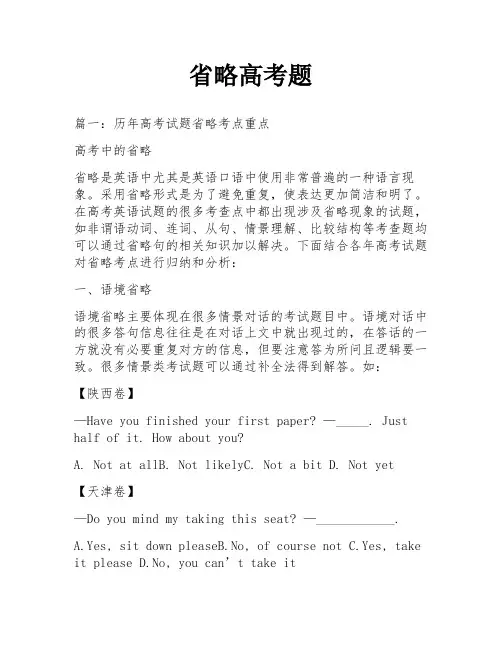
省略高考题篇一:历年高考试题省略考点重点高考中的省略省略是英语中尤其是英语口语中使用非常普遍的一种语言现象。
采用省略形式是为了避免重复,使表达更加简洁和明了。
在高考英语试题的很多考查点中都出现涉及省略现象的试题,如非谓语动词、连词、从句、情景理解、比较结构等考查题均可以通过省略句的相关知识加以解决。
下面结合各年高考试题对省略考点进行归纳和分析:一、语境省略语境省略主要体现在很多情景对话的考试题目中。
语境对话中的很多答句信息往往是在对话上文中就出现过的,在答话的一方就没有必要重复对方的信息,但要注意答为所问且逻辑要一致。
很多情景类考试题可以通过补全法得到解答。
如:【陕西卷】—Have you finished your first paper? —_____. Just half of it. How about you?A. Not at allB. Not likelyC. Not a bitD. Not yet【天津卷】—Do you mind my taking this seat? —____________.A.Yes, sit down pleaseB.No, of course notC.Yes, take it pleaseD.No, you can’t take it二、省略比较结构在上下文含义明了的情况下,有时可以把一些形容词和副词比较结构中的重复信息省略掉,只保留关键信息。
最常见的有省略比较结构中的形容词和副词或比较对象。
如:【07陕西卷】Though he started late, Mr. Guo played the piano as well as, if_____, Miss LiuA. not better thanB. not betterC. no better thanD. better【94全国卷】John plays football ______, if not better than, David.A. as wellB. as well asC. so wellD. so well as【90卷】The pianos in the other shop will be______, but _____ .A. cheaper; not as betterB. more cheap; not as betterC. cheaper; not as goodD. more cheap; not as good三、省略状语从句状语从句的省略也成为高考试题中的考查重心,很多状语从句可以通过省略变成非谓语动词考查题、连词考查题、情景对话考查题等形式,大家解题时要注意此类省略形式。
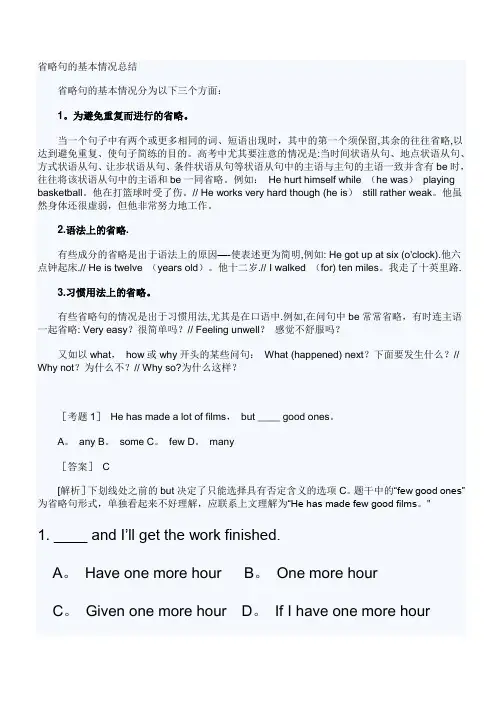
省略句的基本情况总结省略句的基本情况分为以下三个方面:1。
为避免重复而进行的省略。
当一个句子中有两个或更多相同的词、短语出现时,其中的第一个须保留,其余的往往省略,以达到避免重复、使句子简练的目的。
高考中尤其要注意的情况是:当时间状语从句、地点状语从句、方式状语从句、让步状语从句、条件状语从句等状语从句中的主语与主句的主语一致并含有be时,往往将该状语从句中的主语和be一同省略。
例如:He hurt himself while (he was)playing basketball。
他在打篮球时受了伤。
// He works very hard though (he is)still rather weak。
他虽然身体还很虚弱,但他非常努力地工作。
2.语法上的省略.有些成分的省略是出于语法上的原因—-使表述更为简明,例如: He got up at six (o'clock).他六点钟起床.// He is twelve (years old)。
他十二岁.// I walked (for) ten miles。
我走了十英里路.3.习惯用法上的省略。
有些省略句的情况是出于习惯用法,尤其是在口语中.例如,在问句中be常常省略,有时连主语一起省略: Very easy?很简单吗?// Feeling unwell?感觉不舒服吗?又如以what,how或why开头的某些问句:What (happened) next?下面要发生什么?// Why not?为什么不?// Why so?为什么这样?[考题1]He has made a lot of films,but ____ good ones。
A。
any B。
some C。
few D。
many[答案]C[解析]下划线处之前的but决定了只能选择具有否定含义的选项C。
题干中的“few good ones”为省略句形式,单独看起来不好理解,应联系上文理解为“He has made few good films。
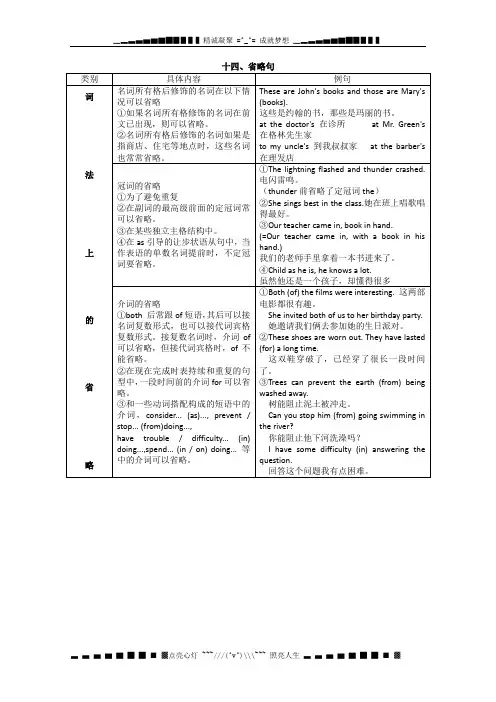
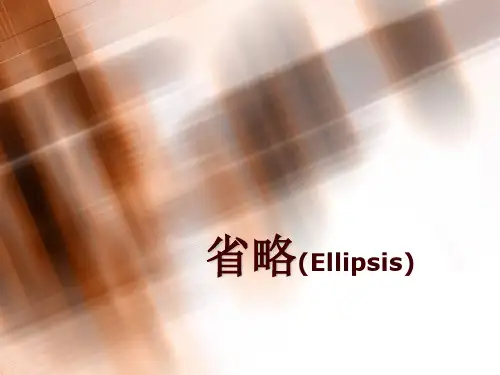

(1) 若than 所连接的两个待⽐较的句⼦有相同成分,通常会有所省略,如说He is much taller than I (am). ⽽不能说He is much taller than I am tall. 但是,若所连接的两个待⽐较的句⼦没有相同成分,则不能省略,否则意思会有所变化。
⽐较: He swims faster than I. 他游泳⽐我(游泳)快。
He swims faster than I run. 他游泳⽐我跑步还快。
(2) 有时⽤于类似以下这样的省略句: Don’t eat more than is good for you. 不要吃得过量。
More food is wasted than is eaten in this canteen. 在这个⾷堂⾥浪费的⾷品⽐吃掉的还多。
Some of the stories were really more than could be believed. 有些故事实在让⼈难以相信。
More people own houses these days than used to years ago. 与⼏年前相⽐,⽬前有更多的⼈⾃⼰有房⼦。
【注】为了便于理解,可以认为这类省略句的than后省略了what(但实际上这个what通常不宜补上,除⾮在英国某些⽅⾔⾥),但也有⼈认为在⼀些类似情况下than有点像关系代词,引导⼀个类似于定语从句的句⼦(但⼜不完全像定语从句,因为有时其前没有先⾏词),这类省略句通常不能补上所缺的主语或宾语(因为than就充当了主语和宾语)。
另外,还有以下这样的省略形式(即不仅省略了主语,⽽且省略了助动词): He returned three days earlier than expected.(=…than he was expected.) 他⽐所预料的早回三天。
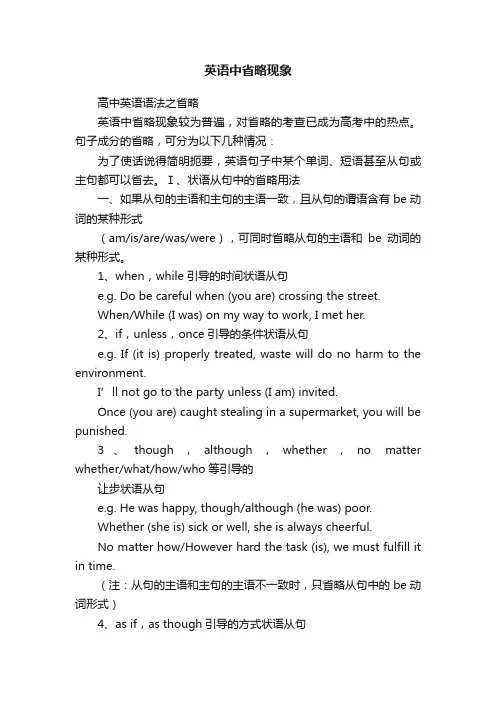
英语中省略现象高中英语语法之省略英语中省略现象较为普遍,对省略的考查已成为高考中的热点。
句子成分的省略,可分为以下几种情况:为了使话说得简明扼要,英语句子中某个单词、短语甚至从句或主句都可以省去。
Ⅰ、状语从句中的省略用法一、如果从句的主语和主句的主语一致,且从句的谓语含有be动词的某种形式(am/is/are/was/were),可同时省略从句的主语和be动词的某种形式。
1、when,while引导的时间状语从句e.g. Do be careful when (you are) crossing the street.When/While (I was) on my way to work, I met her.2、if,unless,once引导的条件状语从句e.g. If (it is) properly treated, waste will do no harm to the environment.I’ll not go to the party unless (I am) invited.Once (you are) caught stealing in a supermarket, you will be punished.3、though,although,whether,no matter whether/what/how/who等引导的让步状语从句e.g. He was happy, though/although (he was) poor.Whether (she is) sick or well, she is always cheerful.No matter how/However hard the task (is), we must fulfill it in time.(注:从句的主语和主句的主语不一致时,只省略从句中的be动词形式)4、as if,as though引导的方式状语从句e.g. He rubbed his eyes and yawned as if/though (he was) waking up after along sleep.He stood up as if/though (he wanted) to leave.(as if/though + to do表示一个将来的动作)二、than,as引导的比较状语从句中的省略用法:当不同的主语进行比较时,一般省略从句中的谓语;当从句中的主语与谓语(be动词除外)和主句中的主语与谓语相同时,通常省略从句中的主语和谓语,只保留比较部分。
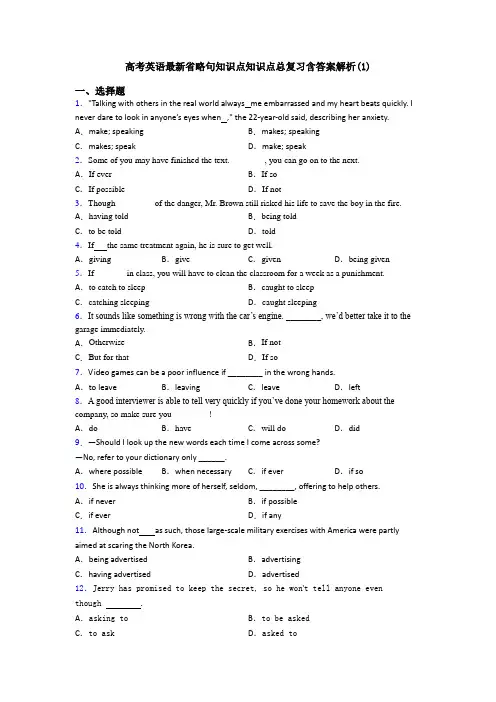
高考英语最新省略句知识点知识点总复习含答案解析(1)一、选择题1."Talking with others in the real world always me embarrassed and my heart beats quickly. I never dare to look in anyone’s eyes when ," the 22-year-old said, describing her anxiety. A.make; speaking B.makes; speakingC.makes; speak D.make; speak2.Some of you may have finished the text. _______, you can go on to the next.A.If ever B.If soC.If possible D.If not3.Though ________ of the danger, Mr. Brown still risked his life to save the boy in the fire. A.having told B.being toldC.to be told D.told4.If the same treatment again, he is sure to get well.A.giving B.give C.given D.being given5.If ______ in class, you will have to clean the classroom for a week as a punishment.A.to catch to sleep B.caught to sleepC.catching sleeping D.caught sleeping6.It sounds like something is wrong with the car’s engine. ________, we’d better take it to the garage immediately.A.Otherwise B.If notC.But for that D.If so7.Video games can be a poor influence if ________ in the wrong hands.A.to leave B.leaving C.leave D.left8.A good interviewer is able to tell very quickly if you’ve done your homework about the company, so make sure you ________!A.do B.have C.will do D.did 9.—Should I look up the new words each time I come across some?—No, refer to your dictionary only ______.A.where possible B.when necessary C.if ever D.if so10.She is always thinking more of herself, seldom, ________, offering to help others.A.if never B.if possibleC.if ever D.if any11.Although not as such, those large-scale military exercises with America were partly aimed at scaring the North Korea.A.being advertised B.advertisingC.having advertised D.advertised12.Jerry has promised to keep the secret, so he won't tell anyone even though .A.asking to B.to be askedC.to ask D.asked to13._____ told that the concert was cancelled, many fans still gathered outside the stadium , waiting for the pop singer.A.Unless B.Though C.When D.Whether 14.Some experts believe that the students, once ______ to computer games, will probably lose opportunities of progressing.A.addicting B.addicted C.having addicted D.being addicted 15.The driver stopped the car a cat across the street.A.to let; to walk B.letting; walkC.letting; walking D.to let; walk16.Some of you may have finished unit one. _____ , you can go on to unit two.A.If you may B.If you do C.If not D.If so17.If _____ for an explanation for an advanced camera, I would certainly find it difficult.A.to be asked B.being asked C.asking D.asked18.They did everything ________.A.as had been originally plannedB.as originally plannedC.as the original planD.as been originally planned19.There is a lot of poisonous gases in the hall. If ____in, they can result in illness and even death.A.breathed B.breathing C.to be breathed D.breathe20.The new treatment means, if _______ to the NCR will make all the difference for the general public.A.applying B.to apply C.applied D.having applied 21.Once _______ in the forest, we should remain ________ we are and wait for help. A.losing; there B.losing; where C.lost; there D.lost; where 22.When ________ for his views about his teaching job, Philip said he found it very interesting and rewarding.A.asking B.asked C.to ask D.having asked 23.______ in the United States, St Louis has now become the 4th largest city.A.It is the 24th biggest city B.It was the 24th biggest cityC.Once the 24th biggest city D.Before the 24th biggest city24.When deeply ______ in work, he always forgets all about eating or sleeping. A.absorbing B.trapping C.absorbed D.trapped 25.When________, the museum will be open to the pulic next year.A.to be completed. B.completingC.being completed D.completed【参考答案】***试卷处理标记,请不要删除一、选择题1.B解析:B【解析】动名词作主语时谓语动词用单数,后一空是"连词+分词"结构,是状语从句的省略形式,补全是when I am speaking。
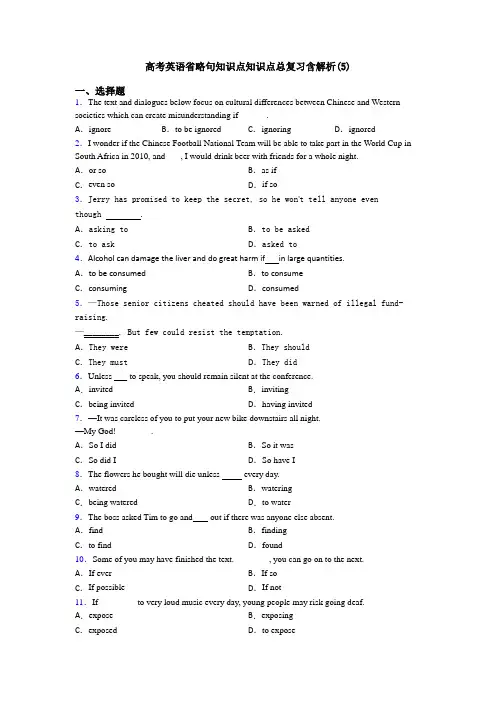
高考英语省略句知识点知识点总复习含解析(5)一、选择题1.The text and dialogues below focus on cultural differences between Chinese and Western societies which can create misunderstanding if ______.A.ignore B.to be ignored C.ignoring D.ignored2.I wonder if the Chinese Football National Team will be able to take part in the World Cup in South Africa in 2010, and ___, I would drink beer with friends for a whole night.A.or so B.as ifC.even so D.if so3.Jerry has promised to keep the secret, so he won't tell anyone even though .A.asking to B.to be askedC.to ask D.asked to4.Alcohol can damage the liver and do great harm if in large quantities.A.to be consumed B.to consumeC.consuming D.consumed5.—Those senior citizens cheated should have been warned of illegal fund-raising.—________. But few could resist the temptation.A.They were B.They shouldC.They must D.They did6.Unless to speak, you should remain silent at the conference.A.invited B.invitingC.being invited D.having invited7.—It was careless of you to put your new bike downstairs all night.—My God!________.A.So I did B.So it wasC.So did I D.So have I8.The flowers he bought will die unless every day.A.watered B.wateringC.being watered D.to water9.The boss asked Tim to go and out if there was anyone else absent.A.find B.findingC.to find D.found10.Some of you may have finished the text. _______, you can go on to the next.A.If ever B.If soC.If possible D.If not11.If ________ to very loud music every day, young people may risk going deaf. A.expose B.exposingC.exposed D.to expose12.—Have you been to the Great Wall?—Perhaps not in my memory; ________, it might have been during the early childhood. A.if any B.if soC.if ever D.if not13.Friendship is like money, easier made than ______.A.being kept B.to be keptC.keeping D.kept14.When deeply ______ in work, he always forgets all about eating or sleeping. A.absorbing B.trapping C.absorbed D.trapped15.Nu r series are the areas where plants are grown to be sold or ______ in other places. A.being planted B.to plant C.plant D.planted 16.Fear is one of the many enemies hidden inside us, and if _____ uncontrolled, it can destroy our lives.A.leaving B.left C.having left D.to be left 17.Unless ________ to speak, most high school students here prefer remaining silent in class. A.invited B.inviting C.being invited D.having invited 18.She is always thinking more of herself, seldom, ________, offering to help others.A.if never B.if possibleC.if ever D.if any19.Unless______, this law will make life difficult for farmers.A.changed B.changingC.being changed D.is changing20.When________, the museum will be open to the pulic next year.A.to be completed. B.completingC.being completed D.completed21.--- The weather forecast says it’ll be fine tomorrow.---________, what about going hiking ?A.If possible B.If necessaryC.If so D.If real22.The driver stopped the car a cat across the street.A.to let; to walk B.letting; walkC.letting; walking D.to let; walk23.The cloth ______easily if _______on a table.A.measures, spreading B.will be measured, spread C.measures, spread D.is measured, spread24.This problem may lead to more serious ones if _______ unsolved.A.making B.remained C.keeping D.left 25.—Frequent lack of breakfast does harm to health.— , why do you always do that?A.So what B.If so C.If any D.Even so【参考答案】***试卷处理标记,请不要删除一、选择题1.D解析:D【解析】【详解】考查省略句。
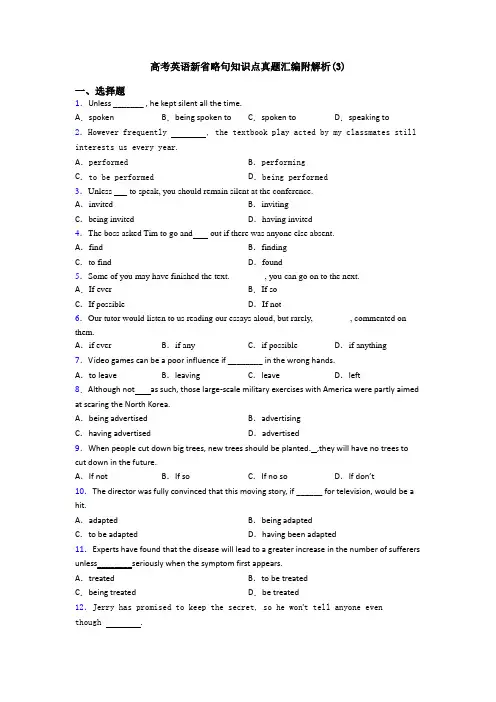
高考英语新省略句知识点真题汇编附解析(3)一、选择题1.Unless _______ , he kept silent all the time.A.spoken B.being spoken to C.spoken to D.speaking to 2.However frequently , the textbook play acted by my classmates still interests us every year.A.performed B.performingC.to be performed D.being performed3.Unless to speak, you should remain silent at the conference.A.invited B.invitingC.being invited D.having invited4.The boss asked Tim to go and out if there was anyone else absent.A.find B.findingC.to find D.found5.Some of you may have finished the text. _______, you can go on to the next.A.If ever B.If soC.If possible D.If not6.Our tutor would listen to us reading our essays aloud, but rarely, ________, commented on them.A.if ever B.if any C.if possible D.if anything 7.Video games can be a poor influence if ________ in the wrong hands.A.to leave B.leaving C.leave D.left8.Although not as such, those large-scale military exercises with America were partly aimed at scaring the North Korea.A.being advertised B.advertisingC.having advertised D.advertised9.When people cut down big trees, new trees should be planted. ,they will have no trees to cut down in the future.A.If not B.If so C.If no so D.If don’t10.The director was fully convinced that this moving story, if ______ for television, would be a hit.A.adapted B.being adaptedC.to be adapted D.having been adapted11.Experts have found that the disease will lead to a greater increase in the number of sufferers unless________seriously when the symptom first appears.A.treated B.to be treatedC.being treated D.be treated12.Jerry has promised to keep the secret, so he won't tell anyone eventhough .A.asking to B.to be askedC.to ask D.asked to13.--- The weather forecast says it’ll be f ine tomorrow.---________, what about going hiking ?A.If possible B.If necessaryC.If so D.If real14.Some experts believe that the students, once ______ to computer games, will probably lose opportunities of progressing.A.addicting B.addicted C.having addicted D.being addicted 15.---How is the man injured in the earthquake?---The doctor said if _________ in a proper way, he was likely to be saved.A.treated B.treatingC.is treated D.to be treated16.Some of you may have finished unit one. _____ , you can go on to unit two.A.If you may B.If you do C.If not D.If so17.They did everything ________.A.as had been originally plannedB.as originally plannedC.as the original planD.as been originally planned18.Once _______ in the forest, we should remain ________ we are and wait for help. A.losing; there B.losing; where C.lost; there D.lost; where 19.When ________ to someone,I usually say,“Pleased to meet you.”A.introduce B.introduced C.introducing D.am introduced 20.Although ________ to stop, he kept on workingA.tell B.telling C.having told D.told21.______ in the United States, St Louis has now become the 4th largest city.A.It is the 24th biggest city B.It was the 24th biggest cityC.Once the 24th biggest city D.Before the 24th biggest city22.When _______the two countries, we’ve found they have much in common. A.compared B.compare C.being compared D.comparing 23.When learning he was admitted to a key college, _________.A.he burst into tears B.tears came to his eyesC.he can hardly keep back his tears D.and his parents were wild with joy 24.Though _______ by her classmates, the little girl didn’t burst into tears or be in despair. A.leaving out B.left outC.being left out D.leave out25.When________, the museum will be open to the pulic next year.A.to be completed. B.completingC.being completed D.completed【参考答案】***试卷处理标记,请不要删除一、选择题1.C解析:C【解析】C 考查非谓语动词。
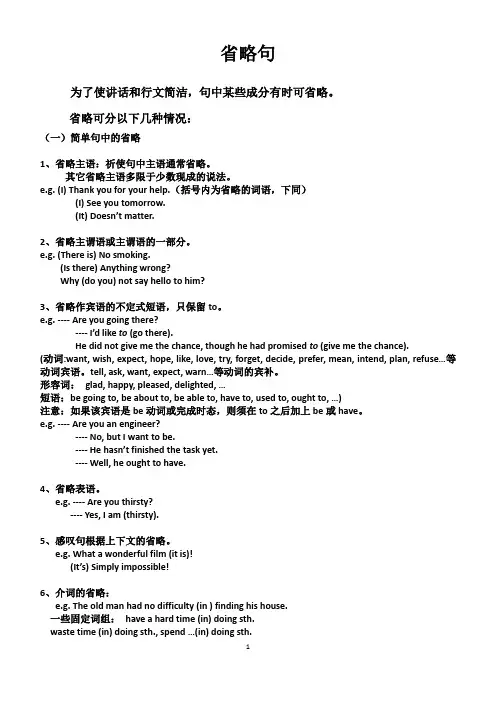
省略句为了使讲话和行文简洁,句中某些成分有时可省略。
省略可分以下几种情况:(一)简单句中的省略1、省略主语:祈使句中主语通常省略。
其它省略主语多限于少数现成的说法。
e.g. (I) Thank you for your help.(括号内为省略的词语,下同)(I) See you tomorrow.(It) Doesn’t matter.2、省略主谓语或主谓语的一部分。
e.g. (There is) No smoking.(Is there) Anything wrong?Why (do you) not say hello to him?3、省略作宾语的不定式短语,只保留to。
e.g. ---- Are you going there?---- I’d like to (go there).He did not give me the chance, though he had promised to (give me the chance).(动词:want, wish, expect, hope, like, love, try, forget, decide,prefer, mean, intend, plan, refuse…等动词宾语。
tell, ask, want, expect, warn…等动词的宾补。
形容词:glad, happy, pleased, delighted, …短语:be going to, be about to, be able to, have to, u sed to, ought to, …)注意:如果该宾语是be动词或完成时态,则须在to之后加上be或have。
e.g. ---- Are you an engineer?---- No, but I want to be.---- He hasn’t finished the task yet.---- Well, he ought to have.4、省略表语。
2022高考英语:(14)二轮语法学案(状语从句中的省略)(练习题配解析或解析)状语从句中的省略省略句的规则是:当从句的主语和主句的主语一致(或者从句的主语为it).而且从句谓语中又包含be动词.在此种情形下能够省去从句的主语和be动词.保留be之后的部分,被保留部分常为现在分词短语、过去分词短语、不定式短语、介词短语、形容词、副词或名词短语。
除while引导的时刻状语从句.when.t.1l/until引导的时刻状语从句。
un less.once引导的条件状语从句.though,although.even.f.even though 引导的让步状语从句等,都能够使用相类似的省略形式。
eg: while(they are)visiting the city.they reeeived a warm welcome.参观那座都市时.他们受到了烈火欢迎。
(现在分词强调动作正在进行) when(he was)asked why he was lale.he kept silent.当问到他什么缘故迟到时.他默不作声。
(过去分词表示被动的动作)Onee(it is)begun.it must be done well.一旦开始.就必须做好。
考题1 ( 典型例题分 ) In their opinion, the Internet, if properly , . holds the key to suc cess in the 21st century.A. to be managedB. managingC. being managedD. managed考题2 He searched the house this morning as if for something.A. look forB. to look forC. looking forD. having looked for考题1点拨:答案为D。
高考英语一轮复习21:省略句一、单选题1.When ________ to the local cultures, people 1learn the foreign languages better.A.exposing B.having exposed C.are exposed D.exposed【分析】当接触到当地文化时,人们会更好地学习外语。
此处是状语从句的省略,从句主语和主句主语people一致,和动词expose之间是被动关系,故完整形式为When people are exposed to the local cultures,当状语从句主语和主句主语一致且从句含有be动词时,可将从句主语和be动词省略。
故选D。
2.— What do you think of Buckingham Palace?—Marvelous! Once ______, it can never be forgotten.A.saw B.to see C.seen D.seeing【分析】——你觉得白金汉宫怎么样?——不可思议的!一旦看到,就永远不会忘记。
本句为状语从句的省略,还原后为:Once it is seen,省略了it is。
故选C。
3.Is this the reason ________ at the meeting for his carelessness in his work?A.he explained B.what he explainedC.how he explained D.why he explained.【分析】这就是他在会议上解释的工作中失误的原因吗?在分析句子的时候可以把疑问句变成陈述句再进行分析,即This is the reason _____ at the meeting for his carelessness in his work.本句的主语为this,因为explain为及物动词,由此可知后面的从句中缺少动词explain的宾语,所以为一定语从句,故选A。
高考英语最新省略句知识点图文解析(1)一、选择题1.—What’s your dream?—Well, my parents wouldn’t expect me to be a banker, but I still .A.hope to B.hope so C.hope not D.hope for 2.Taking this medicine, if _______, will of course do good to his health.A.continued B.to continueC.continues D.continuing3.The boss asked Tim to go and out if there was anyone else absent.A.find B.findingC.to find D.found4.Though ________ of the danger, Mr. Brown still risked his life to save the boy in the fire. A.having told B.being toldC.to be told D.told5.If the same treatment again, he is sure to get well.A.giving B.give C.given D.being given6.---Are you a teacher?---No, but I ________.A.used to B.was used toC.used to be D.used to do7.—Frequent lack of breakfast does harm to health.— , why do you always do that?A.So what B.If so C.If any D.Even so8._____, a man who expresses himself effectively is sure to succeed more rapidly than a man whose command of language is poor.A.Other things were equalB.Other things being equalC.To be equal to other thingsD.Other things to be equal9.When ________how a statue from distant Greece____in China,researchers explained that it was no doubta result of Alexander the Great’s influence.A.they were asked;should appear;B.being asked;can have appeared;C.asked;must have appeared;D.asked;could have appeared;10.—Hi, are you a student of this University?—No, but I ________.A.want to B.want to beC.want so D.want it11.Although not as such, those large-scale military exercises with America were partlyaimed at scaring the North Korea.A.being advertised B.advertisingC.having advertised D.advertised12.The flowers he bought will die unless every day.A.watered B.wateringC.being watered D.to water13._____ told that the concert was cancelled, many fans still gathered outside the stadium , waiting for the pop singer.A.Unless B.Though C.When D.Whether 14.Though _______ by her classmates, the little girl didn’t burst into tears or be in despair. A.leaving out B.left outC.being left out D.leave out15.Check your answers carefully and make some changes ______.A.if you are convenient B.if notC.if it necessary D.if necessary16.Although _____ by the opposite team, the players were not discouraged but practiced harder.A.beating B.beatenC.having beaten D.being beaten17.Some of you may have finished unit one. _____ , you can go on to unit two.A.If you may B.If you do C.If not D.If so18.They finished their work earlier than ______.A.expected B.expectingC.to be expected D.being expected19.There is a lot of poisonous gases in the hall. If ____in, they can result in illness and even death.A.breathed B.breathing C.to be breathed D.breathe20.The new treatment means, if _______ to the NCR will make all the difference for the general public.A.applying B.to apply C.applied D.having applied 21.When ________ for his views about his teaching job, Philip said he found it very interesting and rewarding.A.asking B.asked C.to ask D.having asked 22.Although ________ to stop, he kept on workingA.tell B.telling C.having told D.told23.When deeply ______ in work, he always forgets all about eating or sleeping. A.absorbing B.trapping C.absorbed D.trapped 24.When learning he was admitted to a key college, _________.A.he burst into tears B.tears came to his eyesC.he can hardly keep back his tears D.and his parents were wild with joy 25.When________, the museum will be open to the pulic next year.A.to be completed. B.completingC.being completed D.completed【参考答案】***试卷处理标记,请不要删除一、选择题1.A解析:A【解析】考查省略句。
高考英语省略句解析
省略是英语语法中的一个重要现象,尤其在高考英语中经常会出现
省略句。
省略句的出现不仅能够简化句子结构,使语言更加简练流畅,还有助于提高语言的表达效果。
本文将详细解析高考英语中常见的省
略句,帮助考生更好地理解和应对这一题型。
1. 省略主语
省略主语是英语中最常见的省略形式之一。
当主语在上文中已经明
确指代或暗示时,可以在下文中省略主语,使句子结构简洁明了。
例如:
原句:Tom is good at playing basketball. He often wins the game.
省略主语:Tom is good at playing basketball. Often wins the game.
2. 省略谓语
谓语的省略在高考英语中也较为常见。
当句子的主语为it, this, that, these, those等指示代词时,常常可以省略谓语动词,简化句子结构。
例如:
原句:He knows a lot about computers, but I don't know.
省略谓语:He knows a lot about computers, but I don't.
3. 省略宾语
宾语的省略是一种语言表达的简化方式。
当句子中的宾语是人称代词时,常常可以省略宾语,使句子更加简洁。
例如:
原句:I saw him yesterday, but he didn't see me.
省略宾语:I saw him yesterday, but he didn't see.
4. 省略定语从句
定语从句的省略在高考英语中也颇为常见。
当定语从句的主语和谓语与主句中的一致时,可以将定语从句中的主语和谓语省略,只保留从句中的关系词和其他修饰成分。
例如:
原句:The book that I borrowed from the library yesterday is very interesting.
省略定语从句:The book I borrowed from the library yesterday is very interesting.
5. 省略介词短语
在高考英语中,介词短语的省略也是一种常见现象。
当句子中的介词短语与上文中的介词短语一致时,可以将介词短语省略,使句子更加简练。
例如:
原句:She went to school by bus, and I went to school by bike.
省略介词短语:She went to school by bus, and I went by bike.
综上所述,省略句是高考英语中常见的一种语法现象,其出现能够简化句子结构,使语言更加简洁流畅。
我们需要根据上下文来准确理
解句子的含义,尤其是注意上下文的指代关系,避免误解。
对于考生
来说,掌握并熟练应用省略句的用法是提高英语表达能力的重要一环。
通过多做练习,并结合具体语境,积累经验,我们可以更好地理解和
应对高考英语中的省略句题型。